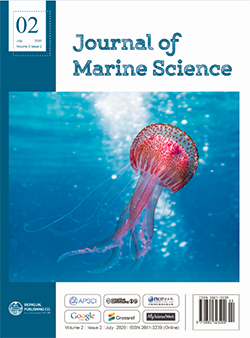Exhibition of Bleaching Resistance Via Adaptive Bleaching Pattern by Coral Reefs of the Gulf of Mannar during Massive Bleaching Event 2019
DOI:
https://doi.org/10.30564/jms.v2i2.1666Abstract
Coral reefs in the Gulf of Mannar (GoM) and Palk Bay regions are facing potential threats from climate change, sedimentation and anthropogenic activities. Considerably, coral reefs in these two regions are highly damaged due to frequent bleaching events caused by increased sea surface temperature (SST) recorded over the past two decades. Recently, during February to May 2019, mass bleaching event of corals was documented again in GoM and Palk Bay regions due to increased sea surface temperatures ranged between 32°C to 36°C. Despite of completely bleached corals, some coral colonies of the same bleached coral species have displayed adaptive bleaching pattern (ABP) for survival. This incidence is displayed by the symbiotic zooxanthellae to protect coral polyps from environmental stress such as elevated temperatures. These observations infer that coral colonies with preferential bleaching pattern ability would serve as environmental stress resisting coral colonies which can be used for restoration activities and cryopreservation. Further studies are needed to explain the potential mechanisms or specific environmental drivers responsible for ABP.
Keywords:
Coral bleaching, Adaptive bleaching pattern, Gulf of Mannar, Palk Bay, TemperatureReferences
[1] Anthony, K.R.N., D.I. Kline, G. Diaz-Pulido, S. Dove and O. Hoegh-Guldberg. 2008. Ocean acidification causes bleaching and productivity loss in coral reef builders. PNAS., 105, 17442-17446.
[2] Arora, M., A. Gujrati, N.R. Chaudhury, P. Chauhan and R.C. Patel. 2019. Assessment of coral reef thermal stress over India basedon remotely sensed sea surface temperature. Geocarto International., Doi. 10.1080/10106049.2019.1624983.
[3] Claar, D.C., L. Szostek, J.M. McDevitt-Irwin, J.J. Schanze, J.K. Baum. 2018. Global patterns and impacts of El Niño events on coral reefs: A meta analysis. PLoS ONE., 13(2), e0190957.
[4] English, S., C. Wilkinson and V. Baker. 1997. Survey manual for tropical marine resource. Australian Institute of Marine Sciences, Townsville, Australia.
[5] Guest, J.R., J. Low, K. Tun, B. Wilson, C. Ng, D. Raingeard et al. 2016. Coral community response to bleaching on a highly disturbed reef. Sci. Rep., 6, 20717.
[6] Howells, E.J., V.H. Beltran, N.W. Larsen, L.K. Bay, B.L. Willis and M.J.H van Oppen. 2011. Coral thermal tolerance shaped by local adaptation of photosymbionts. Nat. Climat. Chang., Doi: 10.1038/nclimate1330.
[7] Huang, D., F. Benzoni, H. Fukami, N. Knowlton, N.D. Smith and A.F. Budd. 2014. Taxonomic classification of the reef coral families Merulinidae, Montastraeidae, and Diploastraeidae (Cnidaria: Anthozoa: Scleractinia). Zoological Journal of the Linnean Society., 171, 277-355.
[8] Hughes, T.P., J.T. Kerry et al. 2017. Global warming and recurrent mass bleaching of corals. Nature., 543, 373-377.
[9] Kinzie III, R.A., M. Takayama, S.R. Santos and M.A. Coffroth. 2001. The adaptive bleaching hypothesis: experimental tests of critical assumptions. Biol. Bull., 200, 51-58.
[10] Krishnan, P., R. Purvaja, C.R. Sreeraj, R. Raghuraman, R.S. Robin, K.R. Abhilash, R.S. Mahendra, A. Anand, M. Gopi, P.C. Mohanty, K. Venkataraman and R. Ramesh. 2018. Differential bleaching patterns in corals of Palk Bay and the Gulf of Mannar. Curr. Sci., 114(3), 679-685.
[11] Lundgren, P. 2011. Genetics and genetic tools in coral reef management: a synthesis of current research and its application in the management of coral reefs, Research publication no.107, Great Barrier Reef Marine Park Authority, Townsville.
[12] Moberg, F. and C. Folke. 1999. Ecological goods and services of coral reef ecosystems. Ecol. Econom., 29, 215-233.
[13] Roche, R.C., G.J. Williams and J.R. Turner. 2018. Towards Developing a Mechanistic Understanding of Coral Reef Resilience to Thermal Stress Across Multiple Scales. Curr. Clim. Chang. Rep., 4, 51-64.
[14] Veron, J.E.N. 2000. Corals of the world Vol. 1-3. Australian Institute of Marine Science Townsville.
Downloads
Issue
Article Type
License
Copyright and Licensing
The authors shall retain the copyright of their work but allow the Publisher to publish, copy, distribute, and convey the work.
Journal of Marine Science publishes accepted manuscripts under Creative Commons Attribution-NonCommercial 4.0 International License (CC BY-NC 4.0). Authors who submit their papers for publication by Journal of Marine Science agree to have the CC BY-NC 4.0 license applied to their work, and that anyone is allowed to reuse the article or part of it free of charge for non-commercial use. As long as you follow the license terms and original source is properly cited, anyone may copy, redistribute the material in any medium or format, remix, transform, and build upon the material.
License Policy for Reuse of Third-Party Materials
If a manuscript submitted to the journal contains the materials which are held in copyright by a third-party, authors are responsible for obtaining permissions from the copyright holder to reuse or republish any previously published figures, illustrations, charts, tables, photographs, and text excerpts, etc. When submitting a manuscript, official written proof of permission must be provided and clearly stated in the cover letter.
The editorial office of the journal has the right to reject/retract articles that reuse third-party materials without permission.
Journal Policies on Data Sharing
We encourage authors to share articles published in our journal to other data platforms, but only if it is noted that it has been published in this journal.




 CH. Ramesh
CH. Ramesh


